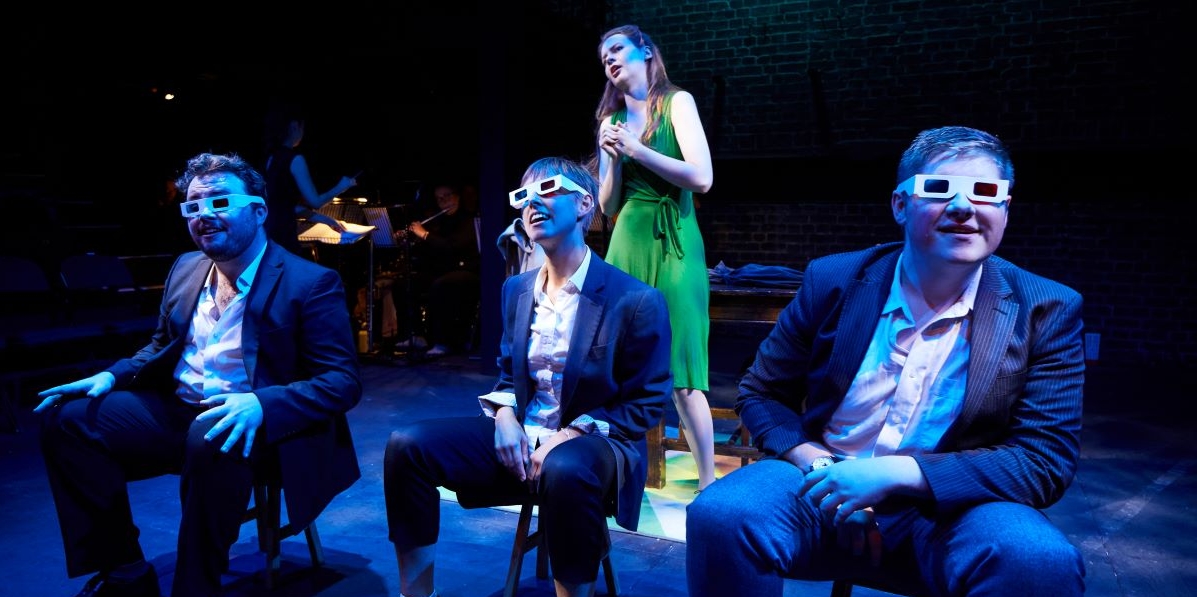‘Trouble in Tahiti’ is a good fit for scheduling at Grimeborn. A not-so-well-known one-act opera by Leonard Bernstein deserves another hearing; and its small-scale forces – two lead singers and a seven-member ensemble and chorus – fit well into Studio 1 at the Arcola. Whilt it is by no means a lost masterpiece, it can tell us a lot about the composer’s priorities in the early 1950s and speaks to blurred boundaries between opera and musical that were typical of the times.
There are seven scenes, with the whole lasting some forty-five minutes. The setting is American suburbia, where a young couple, Sam and Dinah, are unhappily married. They squabble, look back wistfully to happier times of amity, and then refract the same issues through the outside world – he goes to the gym, she to a film (which gives the opera its title); we see him at his office and she goes to her analyst. They both miss their son’s school play. Eventually they return home and tip-toe around the difficult subjects before – ironically – heading out to the same film that Dinah inflicted on herself in the afternoon.
So far, so pedestrian. But we need to put the work back in context. It is dedicated to Mark Blitzstein, whose left-wing, socially aware persona heavily influenced Bernstein. Here Bernstein puts the spotlight on middle-class alienation just as Blitzstein had done for working-class America in ‘No For an Answer’, which Grimeborn showcased earlier this season. Of course Sondheim covers this territory more memorably and in greater depth in ‘Company’ twenty years later; but this does not wipe out Bernstein’s achievement in drawing attention to these themes early on in what he later called, channeling Auden, ‘The Age of Anxiety.’
Moreover, he does so with memorably catchy music. The seven-piece band, here ably conducted by Olivia Tait, offer up some lovely textures alternately bluesy and blowsy that have echoes of ‘Wonderful Town’. There are more reflective moments too, as each singer looks for a garden that will be ‘a quiet place’ from which to escape from the stresses and strains and identity crises of modern life. These numbers anticipate ‘Candide’ and some of Bernstein’s religious music. They are skilfully delivered by Peter Norris and Alexandra Meier, who have a good chemistry with each other, while also taking their solo moments with vigour and confidence. There are some lovely instrumental solos too from Med Diamond, ALiza Dunhill and Robert Winup on flute, trumpet and clarinet.
One of the most original features of this work is the appearance of a trio of singers in the manner of a Greek chorus commenting on the action. Director Finn Lacey makes good use of the split levels at the Arcola to shift them around the space while also weaving them in and around the two leads (who never see them). Just as in a Greek play they offer commentary that leads and interprets our own reactions and emotions as the action proceeds. Tim Burton, Izzi Blain and James Wells blend their part-writing seamlessly and offer a charming perspective on the action that would otherwise be traditional and conventional in direction.
This is a very worthwhile revival that reveals an aspect of Bernstein’s output that deserves greater emphasis and evaluation.

